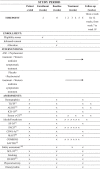ASF (a Compound of Traditional Chinese Medicine) in the treatment of patients with alcohol dependence: Study protocol of a randomized, double-blinded, placebo-controlled clinical trial
- PMID: 33350787
- PMCID: PMC7769360
- DOI: 10.1097/MD.0000000000023899
ASF (a Compound of Traditional Chinese Medicine) in the treatment of patients with alcohol dependence: Study protocol of a randomized, double-blinded, placebo-controlled clinical trial
Abstract
Background: Alcohol dependence is one of the biggest problems facing public health worldwide. Currently, it is an under-diagnosed and under-treated disease. Even when given treatments for addiction withdrawal, over 2/3 of patients who have undergone abstinence-oriented treatment will relapse in the first year. Therefore, it is necessary to find an efficacious way to prevent and treat alcohol dependence. ASF (a Compound of Traditional Chinese Medicine) has proven to inhibit the formation and expression of ethanol-induced behavioral sensitization and the development of conditioned place preference in mice. As an empirical prescription for abstinence from alcohol, ASF has long been used in clinical patients. However, the effect of ASF in humans has not yet been investigated. The purpose of this study is to evaluate the efficacy of ASF for patients with alcohol dependence.
Methods: The effect of ASF will be studied in a randomized, double-blinded, placebo-controlled clinical trial. 82 outpatients and inpatients will be recruited and randomly assigned to treatment with either ASF or placebo for 6 weeks as a complement to cognitive behavioural therapy. The primary endpoints are the changes in the average daily alcohol consumption of the 2 groups before and after treatment and comparison of the scores of the psychological craving self-rating scale during the courses of treatment of 2 groups. The secondary endpoints include abstinence rates of the 2 groups during the follow-up period, days without consumption, and changes of Short Form Health Survey (SF-36) scores in 2 groups before and after therapy.
Discussion: This study is the first randomized controlled trial to investigate ASF in the treatment of alcohol dependence. ASF is likely to be a new and effective drug for the treatment of alcohol dependence developed from natural products with a low incidence of side effects or toxicity.
Trial registration: Registry number: ChiCTR2000039397.
Copyright © 2020 the Author(s). Published by Wolters Kluwer Health, Inc.
Conflict of interest statement
The named authors have no conflict of interest, financial, or otherwise.
Figures


References
-
- WHO. Global Status Report on Alcohol and Health 2014. Geneva, Switzerland. 2014.
-
- Söderpalm B, Ericson M. Neurocircuitry involved in the development of alcohol addiction: the dopamine system and its access points. Curr Top Behav Neurosci 2013;13:127–61. - PubMed
-
- Morgenstern J, Longabaugh R. Cognitive–behavioral treatment for alcohol dependence: a review of evidence for its hypothesized mechanisms of action. Addiction 2000;95:1475–90. - PubMed
Publication types
MeSH terms
Substances
LinkOut - more resources
Full Text Sources
Medical
Research Materials

